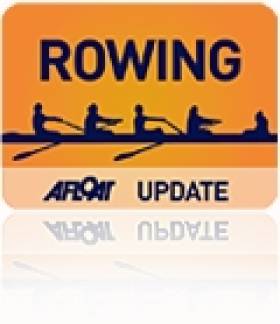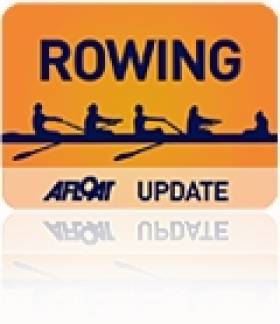Displaying items by tag: Paralympics,
Ireland Finish Tenth at Paralympic Rowing Regatta
# ROWING: Ireland’s adaptive coxed four finished fourth in their B Final, 10th overall, at the Paralympic Rowing Regatta at Eton Dorney this morning. The crew of Anne-Marie McDaid, Sarah Caffrey, Shane Ryan, Kevin du Toit and cox Helen Arbuthnot fought it out for third with Brazil, finishing just .14 of a second behind the South Americans. Canada battled with France at the head of the field and won.
Britain beat Germany in the A Final to win gold, with the Ukraine taking bronze.
Paralympic Rowing Regatta, Eton Dorney – Day Three (Irish interest)
Legs, Trunks and Arms Mixed Coxed Four – B Final (Places 7-12): 1 Canada 3:31.17, 2 France 3:32.01, 3 Brazil 3:36.58, 4 Ireland (A-M McDaid, S Caffrey, S Ryan, K du Toit; cox: H Arbuthnot) 3:36.72, 5 Russia 3:42.73, 6 Belarus 3:45.18. A Final: 1 Britain 3:19.38, 2 Germany 3:21.44, 3 Ukraine 3:23.22, 4 China 3:23.43, 5 Italy 3:27.91, 6 United States 3:30.06.
Ireland Fourth In Fast Rowing Repechage at Paralympic Games
# ROWING: Ireland finished fourth in their repechage of the Legs, Trunk and Arms Mixed Coxed Four at the Paralympic Games at Eton Dorney this morning and will compete in the B Final (places seven to 12) tomorrow. There were two places on offer for the A Final and the Ukraine and China set an impressive pace and qualified in first and second, holding off Canada and Ireland, with Russia fifth.
Canada were A Finalists in Beijing, but the standard in this event has improved radically: Italy won gold in Beijing with a time of 3:33.13, almost 10 seconds slower than Ukraine’s winning time this morning. Italy and the United States qualified for the A Final from the second repechage, where all the crews bar one were faster than the gold medal-winning time in Beijing.
Canada, Ireland and Russia will be joined by France, Brazil and Belarus in the B Final.
Paralympic Rowing Regatta, Eton Dorney – Day Two (Irish interest)
Legs, Trunks and Arms Mixed Coxed Four – Repechage One (First Two to A Final; rest to B Final): 1 Ukraine 3:23.53, 2 China 3:25.03; 3 Canada 3:28.82, 4 Ireland (AM McDaid, S Caffrey, S Ryan, K du Toit; cox: H Arbuthnot) 3:34.85, 5 Russia 3:43.84.

























































